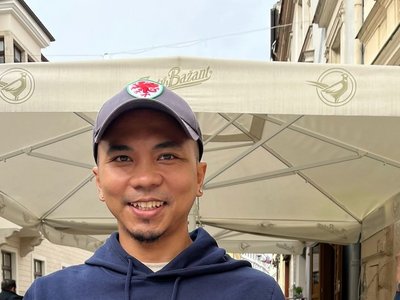

My name is Regletto Aldrich Imbong, I am currently in Vienna for a postdoctoral fellowship under the Ernst Mach Grant – ASEA-UNINET. I am affiliated with the Department of Political Science at the University of Vienna as a Senior Research Fellow under the supervisorship of Dr. Ulrich Brand.
Technology has interested me lately, especially how it has intersected with contemporary social and political realities. Some of the research that was published during my stint as a Senior Research Fellow of the University of Vienna are "Neocolonialism and the Technopolitics of Specialization: Toward a Reimagination of the Sociotechnical Imaginaries Approach" (https://brill.com/view/journals/bjgs/10/2/article-p283_008.xml) and "Good Food in a Technological World: Focal Things and Practices among Lumad Groups in Mindano" (https://www.pdcnet.org/techne/content/techne_2023_0999_6_8_177). The first expounded the issue of specialization in today’s technology development and highlighted the lingering problem of neocolonialism, especially in the Global South. The second proposed a concept of a “good food” by placing in dialogue the philosophy of Albert Borgmann and the experiences of the indigenous peoples of Mindanao, Philippines, the Lumad.
Understanding authoritarianism
My postdoctoral research project investigates the intersections between social media, political power, and knowledge construction. It is provisionally titled "Authoritarian Techniques in the Regimes of Duterte and Marcos Jr. " The Philippine society has faced a great challenge with the rise of disinformation, intensified polarization, and systematized normalization of terror. These issues are like large boulders tied to and are dragging the country’s democracy into the abyss of oblivion. These have posed a great challenge to an already precarious democracy of the country, not only in terms of undermining democratic institutions but also of providing the conditions for the rise and consolidation of authoritarian power. The project aims to understand the specific “techniques” behind the country’s authoritarianism: how it employs the technicalities of social media, constructs consensus-generating knowledge, and enables certain practices. Among the subjects that the project investigates is language, particularly the language of authoritarianism that has flowed through social media and shaped by state agencies. The project aims to identify policy recommendations concerning the regulation of social media, civil society empowerment, civil society-initiated media literacy and education, and legal-institutional reforms.
Vienna’s impact on Regletto Aldrich Imbong’s research
Vienna hosts several outstanding experts and scientists in various disciplines. One of the things that I am grateful for and that have helped my professional development is my acquaintance with some of them. The exchanges we have over lunch, coffee, or a glass of beer have introduced me to some concepts which have served as signposts for my research journey. These signposts have opened new intellectual horizons from where I could view and understand a landscape which I thought was already familiar to me. My supervisor told me once that he was just acting as an enabler for my research. Indeed, his support and the influences of many others have enabled the expansion of my intellectual horizon, which I am also willing to share with others when I get back home.
Aside from this, I also got to meet Filipino migrants in Vienna. Many of them have been here for decades already and are working in the health and services sectors and some retirees from the United Nations Office. Some of them are very interested in my research, especially how they personally got to experience authoritarianism in the Philippines in the 1970s-1980s and now. Their support and company have been a comfort and an inspiration for a scholar who aspires to articulate a truth about his homeland in a foreign land.
I want to forge new relationships and linkages with the academic networks I have been part of here in Vienna. Dr. Martin Slama of the Academy of Sciences has agreed to be part of the international advisory committee of the Aguipo Global South Journal. I have also invited several others. Lastly, I also hope to bridge the signing of a Memorandum of Understanding between my home institution and the Department of Political Science, University of Vienna. The progressive academic tradition and relevant scholarship of the Department of Political Science at the University of Vienna will be an inspiration for developing a “Department of Political Science” at the University of the Philippines Cebu.
About Regletto Aldrich Imbong
Regletto Aldrich Imbong is an Associate Professor of Philosophy of the Political Science Program at the University of the Philippines Cebu, a constituent of the most prestigious University in the Philippines, the University of the Philippines. He has taught philosophy of technology and political philosophy for undergraduates and philosophical foundations of education on the graduate level. Some of his published research works deal with the issues of neoliberalism, neocolonialism, technology, authoritarianism and fascism, as well as Marxism. Furthermore, he is also the president of the All UP Academic Employees Union Cebu Chapter, the union of all academic employees of the University of the Philippines Cebu. There, he is the editor-in-chief of the union’s academic “Aguipo Global South Journal”.
